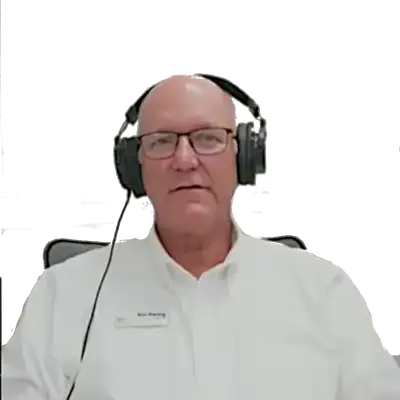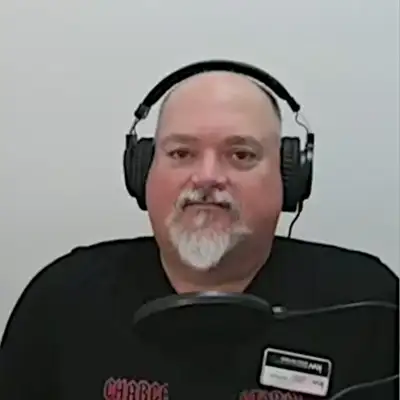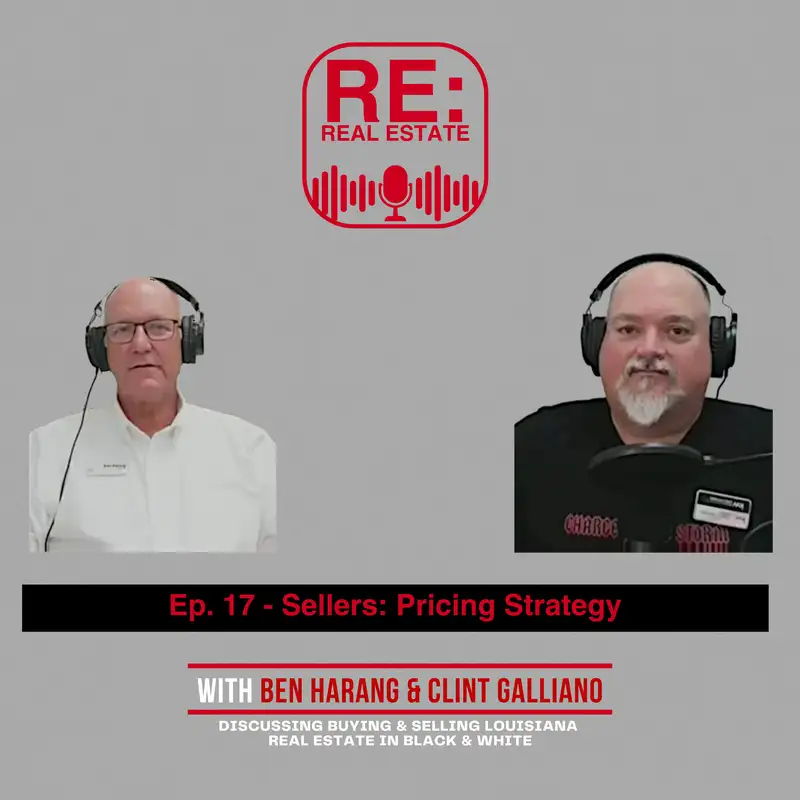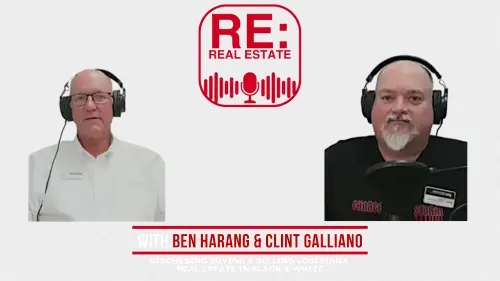Ep. 17 - Sellers: Pricing Strategy
Ben Harang (00:21)
Good afternoon, everybody. Welcome to another episode of RE Real Estate Podcast. I'm Ben Harang with my co-host, Clint Galliano. How you doing today, Clint?
Clint C. Galliano (00:34)
I'm doing wonderful, Ben. How you doing?
Ben Harang (00:37)
I'm doing terrific today. Seems like we kind of have this down to the middle of the week or in the afternoon. Breezy outside, sun is in and out, but there's a 20 or 30 mile an hour wind that keeps kicking. Messes up my hair on occasion, but other than that, we safe and sound inside. So we'll get into it. What we're talking about today.
Clint C. Galliano (01:04)
First off, just want to make the statement that it blew my hair away.
Ben Harang (01:09)
Yeah, we have radio faces, but here we are on video.
Clint C. Galliano (01:16)
Now, indeed. All right, so today we're going to talk about pricing strategy. I think we may touch on initial pricing strategy.
but mainly overall pricing strategy for how we're gonna get the property sold.
Ben Harang (01:41)
Yeah, uh-uh.
Clint C. Galliano (01:41)
So why don't
you take it away, Ben?
Ben Harang (01:45)
All right. The first thing we do in coming up with a price and when we list the house, we literally negotiating the list price with the seller to get it to where we think it should be to give us a chance to sell it. So we look at what's closed on the market in the neighborhood or as close as we can in the shortest amount of time.
in history and then we also look at what's on the market, what's the competition and then we look at, I look at expires on the market, what was on the market and didn't sell and expired out of the market and then we look at days on the market. So our average days on the market is in the neighborhood of a little over 120 days.
from list to close, so that's four months. If you average, we can close it in four months. If it's above average, priced right, we'll close it sooner than that. If it's below average, not priced right, it'll take longer. So we put all of that into our magic dust, and we come up with a suggested range of a list price.
Sometimes the sellers don't like the range I come up with. And it's not our job to tell a seller what they want to hear. It's our job to represent them and to get their household at a price that's acceptable to them. So we take all of that information and we talk about why I think the range is where it is. And one of the objections we get
is well My neighbor T-Bob three doors down sold his house For $50,000 more than that So I think we $50,000 short I said, okay Have have you been to T-Bob's house? Oh, yeah, i've been to T-Bob's house. You know how big it is It's a house. I didn't ever imagine it. You know how big your house is. No Is T-Bob's house bigger than your house? It might be
And I say that just to point out, talk on the street is they might be right that T-Bob sold his house for $50,000 more than my suggestion, but there's a reason for that. Whether it's size, whether it's condition, whether it's additional amenities. So just because a house on the street sold for X number dollars doesn't mean yours will. And if T-Bob's house was nicer than yours, well,
The benefit to you is his price is pulling your house up and your house is pulling his price down. So you rather have the smallest house in a subdivision rather than the biggest house in a subdivision. So the other houses are pulling yours up and you're pulling everybody else's price down from a valuation appraisal market standpoint. So.
Those are some of the things we do. Another price point is let's just say we have a house that's plus or minus $400,000. It would be significantly more advantageous to the seller to list it for $399 or $400 than it would be at 401 because today's buyers look online and they put price parameters in when they search for a house.
So if their top amount is $400,000 and we have it priced at 401, they will never know the price is available, the house is available. So we need to, know, 399, 400, I don't care. But 401, I can't rely. Because they're not gonna put in 399, they're not gonna put in 401, they're gonna stop at 400. So that's just some thoughts on how we get to where we are on a...
on the price of a house when we talk into a seller about listing it for them.
Clint C. Galliano (06:19)
Yeah, it's a, you know, I do that, but I hadn't thought about it. You know, the search part. But it's a real thing, you know, the buyers are saying, well, I want to, you know, stay under this price point. And so they're not going to look at the $500 more.
or the thousand dollars more, they're not even gonna see that in their search because they're dialing in their parameters they're searching for. And so it's not even gonna show up in the search.
Ben Harang (06:50)
You
Right. And that's just for, that's a technology limitation, you know, and that's just the world we live in.
Clint C. Galliano (07:06)
And you know, it's like when I'm, and that's for buyers that are active in the search for properties. When I'm looking for properties for a buyer, I'll tend to go a little outside, just in the event that we could offer a little bit less or anything like that, but that's things we do for buyers. So from the selling side on the price that we list,
Ben Harang (07:22)
Mm-hmm.
Clint C. Galliano (07:34)
That's a technique to make sure that we get on the buyer's radar.
Ben Harang (07:40)
Yeah, and we,
I'm sorry, just a thought before I forget it. It's our job as a listing agent to make sure the world is aware that a house is for sale. And we have two markets. One market is the pool of buyers that are out there. And those people are the most aggressive and see more houses than we do sometimes. We need to make sure they know about it. And we also need to make sure that the other agents
know about it. So we're marketing it to two different groups of people and the agents are the ones that will look outside the parameters like Clint said to try to find something that might be overpriced that they could maybe make an offer on. But I guarantee the buyers if they're to go up to $400,000, they stop it at $400,000. Or if they at $375,000, they might go to $400,000 to look
they're not going to 401 unless they go into four and a quarter. They'll do it every $25,000. Some of them, some of them every 50,000, some of them are just every 100,000. So the savvy agent will do exactly what Clint said, look outside the parameters a little bit to see if there's something right outside the price range to make sure they don't miss something because he's serving his buyer clients as he should.
Clint C. Galliano (09:08)
Yeah, so one of the other things too is a lot of times we'll get pushback and the seller says, I want to list at this amount. This is what I want to get. You know, we've mentioned before, it's like, do you want to get the price you want or do you want to get your house so quickly? Hopefully quickly. And if they say I want to get the price I want, I said, okay, well, we will list at this price, but let's...
go ahead and plan on a price reduction schedule if it doesn't sell and we don't get any showings at this price. Just to let you know, some of the methodologies out there for determining the price. Ben's talked about how we go about doing it, but I want to highlight some. So one is a comparative market analysis. So that's how we go about determining the price that we think
that a home will sell for on the market. And he kind of got into the details of that. Another one is if the seller is still questioning what we come up with with the comparable market analysis is an appraisal. We can bring in a third party to appraise the property that's a licensed appraiser and they can give their opinion of value. That's another way to arrive at a price.
doesn't necessarily mean that it's going to sell at that price because that's that appraiser's opinion of value looking in the back and not necessarily forecasting what he thinks he would it would sell at. That's just his opinion on what he thinks it's worth on that day. The ones that we don't want to use and again we kind of talked about it is well my neighbor's house sold two years ago down the street and my house is better than his. Well
That's not a valuation methodology. And probably one of the more frequent ones that we hear, and it's also not a valid methodology for determining a price, is, well, if you think it'll sell for that, let's go $5,000 or $10,000 over, because that'll give the buyer some room to negotiate down. That's probably one of the most frequent things I hear.
Ben Harang (11:36)
and you know, there are people that will won't buy something if they don't get a deal and those people are probably bottom fishing anyway. The buyers that are in the market or in the market for a reason because they need to buy a house. So if the house is priced properly, they will know the price that the house is priced properly based on the houses they've seen, the condition the houses are in.
Clint C. Galliano (11:47)
and invisible.
Ben Harang (12:06)
the asking prices of the property, the neighborhood the property is in, the buyers are very savvy about what the values are on a house. So when we go to close and we get a buyer, that we find a buyer that's willing to buy the house, then we need to get through the inspection and appraisal and that's for another podcast. if we high on the
the list price and we get a buyer that's willing to pay it, we still have to get through the appraisal, which in all likelihood will knock it down and then we have to renegotiate the price anyway. And as far as leaving room for negotiations, everybody wants a deal. I get it. But the closer the house is listed for the
The closer the list price is to the actual sales price, the faster and more money it's gonna sell for. We don't wanna under price it, but we wanna get it very close to what the market value is because there's buyers out there that understand the value and the options that are out there. We're in a buyer's market, but we have a limited inventory. So you can...
We still kind of add an equilibrium. You might have to give a little bit from the seller side to get it sold, but there are enough buyers out there for the right house, they're going to buy it. And as far as making an offer to have some room to negotiate, once we tell them, we're not negotiating and the house is priced properly, either they were not going to pay the price anyway.
Are they going to say, okay, I was just trying to get a deal, but I understand it's worth that in today's market. So I think it's better just to say no to an underpriced offer than it is to have it overpriced and negotiate the offer. And that's just me after 30 years of doing this, we make more deals like that than we do negotiating because when we negotiate it becomes a game to one side or the other.
They're just not going to buy it unless they have the last word. And you don't want to have to sell your house to that buyer. And if we overprice it, we may have to.
Clint C. Galliano (14:35)
Yeah.
The, just popped into my head other pricing methodologies that people get hung up on is the Zillow's Zestimates.
Ben Harang (14:51)
Yeah.
Clint C. Galliano (14:53)
Sometimes they can be accurate, but the majority... Well, no, no, I know you are laughing at me. Exactly. But people see that and the ultimate issue is that all of these automated valuations are based on data and they...
Ben Harang (14:56)
I'm sorry, didn't mean to laugh at you, Clint. I'm not laughing at you.
Clint C. Galliano (15:21)
manipulate the calculations to give a price that's fairly accurate. But if the underlying data that they're using doesn't reflect what's actually going on in a market, or it's not updated frequently enough or something like that, then it can give you an inaccurate estimated price. We've got our own
automated price estimate tool, market value tool, whatever you want to call it. We've got it on our website in our mobile app and it's based on publicly available data but it doesn't work on every home. What I've noticed on a house in my neighborhood, there's one or two houses in my neighborhood
Ben Harang (15:57)
Mm-hmm.
Clint C. Galliano (16:18)
that the valuation is off by $100,000 or more. And so I started digging into that because my background is data and analyzing data and stuff. And what I figured out is that their
Ben Harang (16:23)
Mm-hmm.
Clint C. Galliano (16:38)
their assessed value was frozen because the owners were over 65. And probably about 15 years ago, which was about when the home prices were at about $150,000 in my neighborhood. And so that is likely a big component of how they determine that value range in that algorithm.
Ben Harang (16:45)
Mm-mm.
Yeah.
Clint C. Galliano (17:07)
And so every one of these automated valuation tools uses something similar. And so we look at it and kind of use it as maybe a guideline, but we can look at it and say, yeah, that's out of whack. That's wrong.
Ben Harang (17:22)
Right. And
the more pieces of data we have to analyze, the more accurate the final price range is. You know, and look, you might have a house that deserves to be in the high end of the price range. And if it does, the buying public, it's going to acknowledge that. But most of us, me included, feel like my house, I made it my home.
Clint C. Galliano (17:31)
Correct.
Ben Harang (17:52)
over the last 30 years and it's, I appreciate it probably more than anybody else. If I put it on the market, the buying public may or may not share my opinion of my house. So I'll tell sellers sometimes that look, you like your house, I get it. But you might end up buying your house to stay here if you like it more than the buying public.
But if you can't stay here, then we need to find the next guy that wants to buy it. So you need to be realistic on the front end. And I tell people, it sounds like I'm not advocating for the seller. I'm absolutely advocating for my listing clients because I want to get it sold. And it's a give and take between them and me. They need to make a decision whether or not they're going to hire me to list their house.
I need to make a business decision if I'm going to take my time to try to sell a house that I may not be able to sell. So on occasion, I've been known to tell somebody, good luck and God bless you. I hope you sell your house. I can't help you because we can't come to terms on a price. And others have told me, look, I can't live with your price. So we need to do something else. And I get it. You know, and one one of us is wrong in that situation.
I don't bet, but I think 30 years of experience tends to favor what I say as opposed to somebody that's trying to sell their own house and squeeze the last penny out of.
Clint C. Galliano (19:39)
So hopefully today we... Oh, go ahead.
Ben Harang (19:40)
So one other thing, no,
one other thing, Clint touched on it, but we negotiating this, right? Because we both want the same thing. I want to sell your house, you want to sell your house, let's work together and get it done. And if you want to try having it five or $10,000 above the price range, I'm not necessarily opposed, and I think Clint might have touched on it earlier. Let's have a predetermined.
Timeline with a predetermined price reduction If it's not nothing happens in seven days 14 days 21 days 30 days pick the pick the timeline but have a Have it written down in the listing agreement in 14 days if it had if we don't have a an accepted agreement on it we're reducing it by X number of dollars and We drive the price until the market responds and also tell people
When when it's overpriced, you don't know Who's looking at your house online because it's all about online stuff, but I guarantee you as soon as we lower that price There's increased activity on the house The the new list price may not get it sold, but it's getting the activity which proves People are watching it which proves it's overpriced which proves There are buyers out there So you drive the price?
over time to find the real price. Because sometimes we're wrong. We're not infallible. But sitting there, $25,000 over price with nothing happening, doesn't do anybody any good. Certainly not the sell.
So have a plan to drive the price to sell the house.
Clint C. Galliano (21:31)
Yeah, I've had that happen. that's a listing I have right now where we had maybe two showings over the last year. Yeah, year. And we've had five people reach out or schedule showings within the last week since we dropped the price again.
Ben Harang (21:42)
Mm-hmm.
Clint C. Galliano (21:59)
And it's like, okay, now we're getting interest.
Ben Harang (22:02)
We're
getting close. You might not be there yet, but you're like closer. And we see it happen over and over and over again. Worst thing that can happen to a house is to just sit on the market. So anyway, we're giving it our best shot as far as pricing, because nobody really knows what the buying public's willing to pay for it.
Clint C. Galliano (22:06)
Yep.
Ben Harang (22:30)
We think we have a pretty good idea, but until we actually put it on the market, we don't, we don't know. And what I like to get the, get the house ready. And we talked about this in a previous podcast about having pressure on the house. The house is ready. The house is ready. We get the pictures, all our pans have been made is it's ready to go. And it's like, we're keeping the lid on a pressure cooker or a third bread race horse in the starting gate. We get it all ready and then we release it to the market.
Good things happen when it's done right.
Clint C. Galliano (23:06)
Yeah. Well, hopefully today we've explained at least how we think about pricing and property and that it's not, well, we want to do this, you know, and we want to do that. It's not about that. It's about getting you all sold in the optimum timeframe for you. So.
Hopefully you understand a little bit better on how we do that and how we get that done. So if you have any questions, you can call Ben or myself. Feel free to reach out to us. Our contact info is in the show notes. You can also like, subscribe, share, or comment.
to watch this on YouTube or whatever, however you feel like consuming it. You know, give us a holler.
Ben Harang (24:08)
Yeah, Clint's the audiophile like the, I don't like recording it, but I like having the video out there. I feel like it allows people to connect a little better than just the audio. So we, that's how we ended up doing it. We released the podcast on both audio and video platforms. YouTube being the video and Clint's audiophile.
sites like iHeartRadio and Spotify and Apple and all the ones I never heard of before still out there. So wherever you get wherever you get your podcast you can find this and it's RE Real Estate Podcast. The website is RERealEstatePodcast.com and there's links to audio video versions. We have a buyer series we're working on a seller series. So there's a lot of good information for people that are in the market to buy and sell real estate.
Just from two guys in south Louisiana, they do it every day.
Clint C. Galliano (25:13)
Yeah. And if you want, if you have questions that you want us to answer on the podcast, go to re real estate podcast.com and look at the top menu for ask a question. You can leave us a question there and we'll answer it on the podcast.
Ben Harang (25:31)
absolutely All right well that kind of wraps it up for the day I think Clint. We'll see if I can go outside and not mess up my hair getting to my truck and we'll see y'all next time. Have a good one.
Clint C. Galliano (25:37)
Yes, sir.
YouTube in.
Ben Harang (25:48)
Thanks.
Creators and Guests



